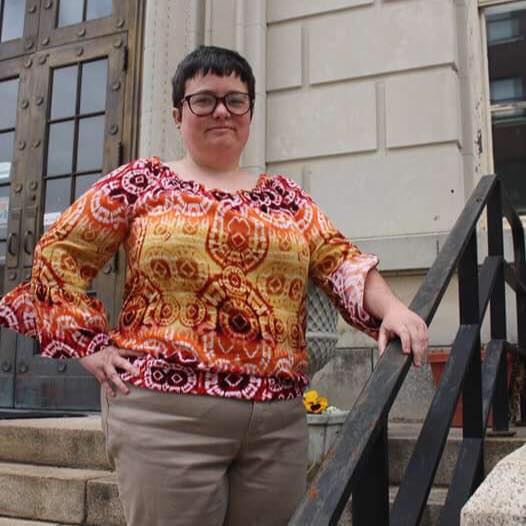Special to Palmetto Counseling’s Blog | August 12, 2017 3:06 PM EDT
This issue features an article by Freelance Mental Health Writer, Lisa Fourman

The definition of generalized anxiety disorder is an excessive worry about many things. According to the ADAA, this anxiety disorder affects 6.8 million adults.
That’s a lot of people and it includes me. I’ve been suffering with this disorder since 2006 when I was in high school. What are the symptoms of generalized anxiety disorder, you ask?
Symptoms of the disorder include: feeling wound tightly enough that you feel like you’re going to snap, having trouble falling or staying asleep, tension in your muscles, irritability, fatigue, and having trouble concentrating.
For those who go through these symptoms, it’s a struggle to get through the day. I have had each of these before in my journey for help and I’ve had some of them all at once. There are a lot of people who suffer with the disorder in complete silence.
They are afraid to get the help they need for reasons I can understand. What if they’re laughed at for wanting help? What if no one understands them? What if they try to get the help they know they need but the help doesn’t give them any relief?
These are questions I’ve asked myself in my own time as I thought about getting support for my anxiety. I couldn’t help wondering if therapy was worth it until I decided I couldn’t go on without treatment.
In the end, I decided to try medication management for three reasons: my sanity, doing what is best for me, and wondering what else I had to lose. These reasons were simple enough for me. I hope they can help you too.
TAKING A STAND FOR MY SANITY
Having an anxiety disorder is not a walk in the park. You worry about everything that crosses your mind. You feel trapped in a cage of sorts inside of your mind.
You can’t move in this cage and it’s locked tighter than anything you’ve ever seen. You fear that you’re losing your sanity as you panic over the smallest of things.
For me, the choice of avoiding people was an easy one to make. I hated getting into arguments with people, especially customers at work.
Why would I want to put myself in that situation where my anxiety would go through the roof? I had enough trouble just sitting at my desk, going about my work. I refused to make things worse for me.
This is what I’ve dealt with for years before seeking treatment. I finally decided that enough was enough. I wanted to do what is best for my sanity.
I didn’t want to spend my life with my anxiety in control of every action I take. I decided to take a stand for my sanity and for my life itself.
I couldn’t continue down the path I was going where the anxiety ruled my life in every way. I refused to let myself stray down a path where my health was completely sub-par.
Taking a stand for your sanity doesn’t have to be difficult. It can sometimes be a choice between life or death but know that it is as serious as you make it to be.
DOING WHAT IS BEST FOR ME
I knew something in my life had to change if I wanted a life where I could be happy. I didn’t want to live, looking over my shoulder at every turn.
Getting treatment was the best thing for me. My anxiety was at an all-time high and I knew I had to do something about it. I’d been dealing with it for over 10 years by this point, after all.
Having anxiety has led to me missing out on so many events with friends. That’s not to mention the job opportunities I’ve passed on because of my anxiety! I’ve left 3 jobs because of the panic attacks that kept me up at night.
I knew that if I could get proper treatment for what I was suffering with, I could feel better for the first time. I don’t remember a time when I didn’t feel any sort of anxiety. How can you call that living?
That’s a question I asked myself as I wondered if I should even get treatment. That’s when the answer to that question became obvious to me. Going through with it was the best thing for me.
I have tried medication management and mindfulness tactics, both of which seem to work the best for me. If you don’t know what works for you, try a breathing exercise.
Breathe in for seven seconds, hold it for four seconds, and then release it in eight seconds. Do this several times until your heart rate has slowed down to a normal rate. Focusing on the breathing helps calm the brain down when it’s going too fast.
WHAT DID I HAVE TO LOSE?
This is not a question I thought I would ever ask myself. It is not something I thought much about. Having anxiety means I hesitate with every decision to the very end.
It means I am not sure about any decision I make, no matter how big or small that decision might be. It’s a terrible way to go about life so I decided to make a change in this regard as well.
I considered my options and this one question came up: what did I have to lose? If I got treatment for my anxiety and it failed, would the anxiety be any worse?
No…no it wouldn’t. My anxiety would always be there in the back of my mind, no matter what I did to stop it. So why couldn’t I do something about it? Why couldn’t I do something about it?
I didn’t have anything else to lose at this point since I didn’t have much to begin with. That is what anxiety does to you as well: it takes everything you love away from you.
If I get treatment for my anxiety and it doesn’t work, then it’s on to the next thing. I could get some valuable insight into my life with anxiety: what does and does not work.
What I Learned about My Life with Anxiety
Living with anxiety can be one heck of a challenge even with the advantage of treatment for it. It is almost like a roller coaster of sorts that you can’t get off, no matter how hard you try.
Getting treatment for anxiety has been the best decision I ever made. I made the decision so I can have a life of happiness instead of a life of dread and anxiety.
Getting the medication that works for me has slowed my heart rate down tremendously, I’m no longer focusing on the anxiety, and I don’t live in a state of constant fear. I’m free of the cage that anxiety has kept me in for so long!
Getting free of the cage takes time but getting the right treatment for your anxiety can mean all the difference for you. For me, it took me two years to find the right medication but I know now that I’ll be alright. For me, that’s all I needed in a life of anxiety-ridden distress.
It gets tiring if you live a life full of emotional turmoil so I urge you to do something about it. If you need help and you know you need help, I urge you to get that help.
I urge you to get the help you need to live the life you want to live. There is no shame in admitting that you can’t do things on your own. That is where support comes in. Won’t you get help today?

Lisa is a freelance writer in the mental health niche, who has generalized anxiety disorder. She is addicted to Facebook and reading long fantasy novels.
We are pleased to announce that Palmetto Counseling is currently accepting referrals for Group Therapy:
Dialectical Behavioral Therapy [DBT] Group [Adults]: Frequently used to treat symptoms associated with Borderline Personality Disorder, clients in DBT can expect to be assigned therapeutic homework, role-play alternate ways of interacting with other people, and practice adaptive coping skills such as distress tolerance, emotion regulation, mindfulness, radical acceptance, interpersonal effectiveness and other positive means of managing intense feelings or emotions when angry, depressed, anxious, or upset. These skills are an important component of DBT and are reviewed in weekly groups as the Group Facilitator helps clients to learn, apply and master DBT skills.

Issues Addressed: Symptoms frequently associated with Borderline Personality Disorder such as severe depression, trauma, anxiety, patterns of engaging in self-harm behaviors, cutting, suicidal thoughts / suicidal urges, and suicidality.
When: For more information or to make a referral, please contact us at (803) 329-9639
Group Facilitator: Alissa Hager, LPC
Cognitive-Behavioral Therapy [CBT] Coping Skills Group [Adults]: Backed by years of empirical support and widely accepted by mental health practitioners, CBT is a highly structured group intervention that teaches individuals to identify and learn effective problem-solving skills, how to express feelings and how to focus on the “here and now” to minimize thoughts and behavior that lead to problems. The interventions in group therapy feature modeling, role-play, help the client challenge irrational or negative thoughts and therapeutic homework exercises.
Issues Addressed: Anxiety or Fears, Depression, Self-Esteem, Stress / Anger Management, Coping Skills
When: For more information or to make a referral, please contact us at (803) 329-9639
Group Facilitator: Alissa Hager, LPC
WHAT DID I HAVE TO LOSE?

Mary Beirne Taylor, MEd, ED.S, LPC, NCC
Mary Beirne Taylor earned her Bachelor of Science in Psychology from Wofford College and Master’s Degree in Clinical Mental Health Counseling from Clemson University. Additionally, she holds an Education Specialist Degree and a Bachelor of Arts in Modern Language and Culture (Spanish), and has experience counseling Spanish-speaking families.
Licensed in South Carolina, Ms. Taylor has provided therapy to children in elementary school settings. She specializes in counseling children with Depression, Anxiety, ADHD, Trauma, Autism, Obsessive-Compulsive Disorder, and Anger issues. Although treating children of all ages is her specialty, Mary Beirne also enjoys working with adults in individual counseling and family therapy.
Ms. Taylor has a genuine passion for working with children, is energetic, creative, non-judgmental, adaptable and flexible in her approach, and is deeply committed to working collaboratively with clients and their families.
Alissa received her Masters of Education in Community Counseling from Winthrop University and is a Licensed Professional Counselor in South Carolina. Areas of interest include working with adolescents and their families as well as adults. Ms. Westphal has 7 years experience working with both adults and adolescents in inpatient and outpatient settings.

As part of her work with clients, Alissa firmly believes that the counseling relationship is a very personal and intimate relationship, with set limits and defined professional boundaries. The most crucial aspect of this relationship is trust. Counseling is a joint effort which cannot be successful or effective without hard work, dedication, and courage to change.
“I come from a strengths based perspective, where we will help identify positive characteristics that can help you overcome your concerns and lead a happier, more fulfilled life. In order to change behavior, I believe it is important to change perspectives and thinking patterns, and explore alternatives to maladaptive or negative ways of coping in a safe, nurturing environment.”
Alissa’s specialties include Dialectical Behavioral Therapy [DBT], Trauma, Oppositional Defiant Disorder, and Play Therapy. In addition to working with teens and their families, Alissa enjoys working with adults.
With several licensed counselors to choose from, our caring team of professionals is ready to assist you in meeting your behavioral healthcare needs.






Do you have an article on mental health, addiction, substance abuse, mental health advocacy or other important topic you would like to submit?
Let us know if you would like to be featured as a Special Guest Contributor to PCC’s Blog by contacting us at info@pccrh.com




